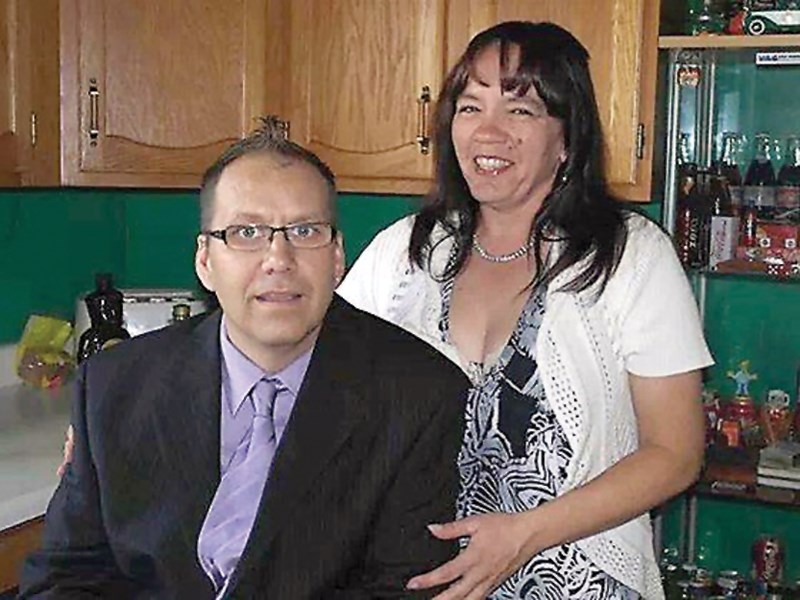It was in 2013 when Jeff Hildebrand was first told he had cancer.
Initially he was told it was terminal, then the prognosis changed and he was told he would likely survive, but now two years later, the outlook is once again ominous.
Given his circumstance, Hildebrand isn’t giving up hope, and is now one of 30 North American participants in a case study which will attempt to slow the cancer’s spread, but also provide valuable medical research that will hopefully save lives in the future.
Hildebrand’s wife, Michelle Monk-Hildebrand, said before he was diagnosed, doctors couldn’t figure out the problem.
“He was at emergency and they thought he had pneumonia and that was a wrong diagnosis. Two months later he got in to see the doctor and he said it might be a hernia, but (the doctor) wasn’t sure,” she said, adding a later hospital visit resulted in Hildebrand going for further testing. “It ended up it was his liver. His liver had doubled in size.”
By the summer of 2013 doctors made the diagnosis of cancer and Hildebrand was given six months to live.
“He got news September 19 that it was liver cancer and to put his affairs in order and that it was pretty much terminal,” she said. “That was the day of my birthday. This was not the gift I wanted.”
In October doctors determined Hildebrand could not be the recipient of a liver transplant and was told to prepare for the worst.
“We turned around and did the will, all the things you have to do when you’re going to die,” she said.
In December, Hildebrand got a surprise phone call that revealed his cancer was not terminal and that he should survive.
“They explained to us it wasn’t liver cancer, it was non-Hodgkin’s lymphoma and that he had an 80 per cent chance and all looked good,” she said. “He did six months of chemo, things were shrinking, things were doing what they were supposed to, everything was going to plan.”
In the spring of 2014 doctors suggested a stem-cell transplant in hope of removing the last of the cancer. The transplant did have some positive results, but did not make Hildebrand cancer-free.
In March 2015, when going for a check-up after undergoing a liver resection, the couple were told the cancer had spread and that there’s nothing that can be done.
“A person gets told that they’re going to die once in a lifetime, never twice,” she said.
A day after receiving the unfortunate news, the pair were made aware of the case study in Edmonton.
“We had just done a year-and-a-half of very intense chemo, a stem-cell transplant, a liver resection … do we do this, or do we let nature take its course?” she said. “Jeff was like, ‘I can’t give up, I’m going to try it.’
“So now, Jeff travels pretty much every other day to the Cross Cancer Institute and he’s part of a case study that only 30 people in North America are a part of.”
While not guaranteeing results for Hildebrand, the study may buy him some more time.
“All the doctors said to him was all that we can promise you is maybe we can slow it down, but you are going to die from this,” she said.
Participation in the study, however, is costly as they’re driving almost daily to the city. To help the Clyde Rebel Riders 4-H Riding Club have started fundraising through the crowd-funding website YouCaring.com.
“I’m the general leader of the 4-H group and it’s all volunteer,” she said. “I’ve grown quite close to the kids, I have no kids in 4-H. I do this because I like the kids, and I have for the last four years.
“When the kids found out, because I had stepped back from 4-H they decided they wanted to do something.”
The campaign, kick started by the 4-H club, is to raise $5,000 towards Hildebrand’s expenses. Monk-Hildebrand said she’s thankful and proud of the kids for stepping up to lend a helping hand.
“I’m so touched by the kids, I was kind of taken back and touched,” she said. “I’m proud of the kids … I’m very, very proud of all the kids.”
As for Hildebrand, his participation in the case study will likely be one of his final acts of generosity.
“For Jeff, throughout his life he has been a truck driver, has done many things like Special Olympics convoys, he has done things for multiple sclerosis, he’s always taken his trucks for shows for that,” she said. “Now, at the end of his days, he is partaking in a case study that will hopefully help people.
“He says, ‘Maybe they cure two people if they see what it does to me.’”
Anyone looking to help can donate online to the Jeff Hildebrand’s Journey With Cancer fund online via YouCaring.com, or can donate to the Hildebrand Family Donation Account at any Servus Credit Union branch.



